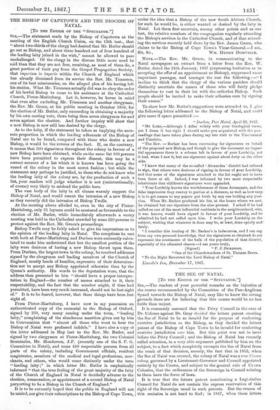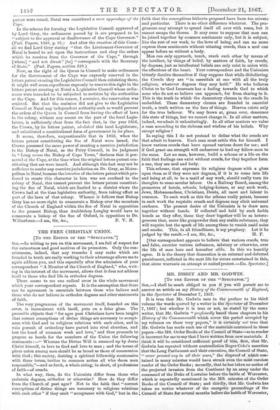THE SEE OF NATAL.
[To THE EDITOR OF THE " SPECTATOR."] SIR,—The readers of your powerful remarks on the injustice of the course recommended by the Committee of the Pan-Anglican Synod towards the Bishop of Natal, may like to know the strong grounds there are for believing that this course would be no less futile than unjust.
It is commonly assumed that the Privy Council in the case of Dr. Colenso against Dr. Gray decided the letters patent creating the See of Natal to be as invalid for the purpose of conferring coercive jurisdiction on the Bishop, as they decided the letters patent of the Bishop of Cape Town to be invalid for conferring coercive jurisdiction over him. But this point was not in issue before the Privy Council ; and the Bishop of Natal has recently called attention, in a very able argument published by him on the subject, to a fact which completely exempts the See of Natal from the reach of that decision, namely, the fact that in 1853, when the See of Natal was created, the colony of Natal was a true Crown colony, governed by a Lieutenant-Governor and Council appointed entirely by the Crown, and subject to the general rule of Crown Colonies, that the ordinances of the Sovereign in Council relating to them have the force of laws.
It is true that the letters patent constituting a Legislative Council for Natal do not contain the express reservation of this right of the Sovereign usual in such patents. But the reason of this omission is not hard to find ; in 1847, when these letters
patent were issued, Natal was considered a mere appendage of the Cape.
In the scheme for forming the Legislative Council approved of by Lord Grey, the ordinances passed by it are proposed to be "subject to the approval or disallowance of the Cape Governor." (Parl. Papers, 1848, p. 91.) And after the creation of this Coun- cil we find Lord Grey stating "that the Lieutenaut-Governor of Natal is bound to act upon the instructions and obey the orders which he receives from the Governor of the Cape," through [whom] " and not direct" [he] " corresponds with the Secretary of State." (Past Papers, section 228.) Now, as the right of the Queen in Council to make ordinances for the Government of the Cape was expressly reserved in the letters patent creating the Legislative Council then subsisting there, it might well seem superfluous expressly to reserve this right in the letters patent creating at Natal a Legislative Council whose ordin- ances wero intended to be subjected to revision by the authorities at the Cape. And for this reason, I conceive, the reservation was omitted. But that the omission did not give to the Legislative Council at Natal any independent authority such as would prevent the orders of the Queen in Council from having the effect of laws in the colony, without any assent on the part of the local Legis- lature, is sufficiently clear from the fact that, in the year 1856, the Crown, by its letters patent, abolished this local Legislature, and substituted a constitutional form of government iu its place.
It seems, therefore, unquestionable that in 1853, when the letters patent constituting the See of Natal were issued, the Crown possessed the same power of creating a coercive jurisdiction in the Bishop of Natal, as the Privy Council, in its judgment in "Long versus the Bishop of Cape Town," declares that it pos- sessed at the Cape, at the time when the original letters patent con- stituting that see were issued. And although this fact may not be sufficient to confer any coercive jurisdiction on Dr. Gray, as Metro- politan in Natal, because the intention of the letters patentwhich pro- fessed to create this character in him was not confined to the- colony of Natal, this cannot prevent the letters-patent constitut- ing the See of Natal, which are limited to a district where the Crown had at the time legislative authority, from taking effect as part of the laws of that colony. Whence it follows that Bishop Gray has no more right to consecrate a Bishop over the members of the Church of England within the See of Natal in opposition to the present Bishop, than Archbishop Longley would have to consecrate a bishop of the See of Oxford, in opposition to Dr.







































 Previous page
Previous page